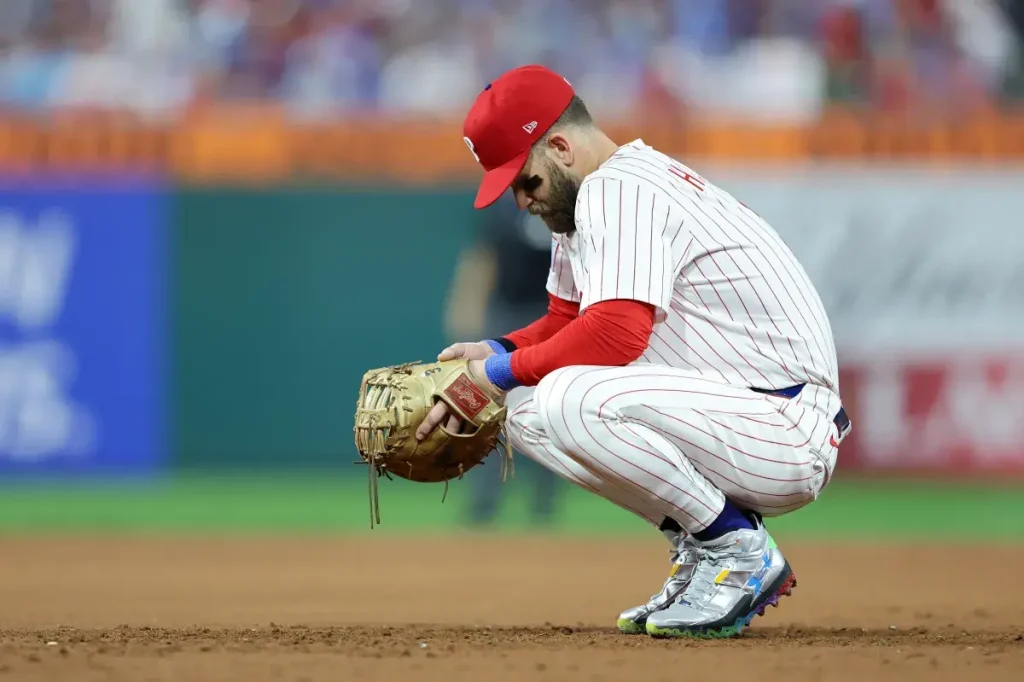Bryce Harper Embraces Fan Criticism Amid Phillies’ NLDS Struggles
In the high-pressure crucible of postseason baseball, even the brightest stars can dim momentarily. Philadelphia Phillies slugger Bryce Harper finds himself in precisely this position during the National League Division Series against the Los Angeles Dodgers, where his performance has fallen well short of the superstar expectations that come with his name and contract. Through the first two games at Citizens Bank Park, Harper has managed just one hit in seven at-bats while striking out three times. This offensive drought has contributed significantly to Philadelphia’s precarious position, down 0-2 in the series despite having home-field advantage. Rather than shrinking from the criticism that naturally follows such struggles, Harper has met the fans’ frustrations with remarkable self-awareness and perspective.
When the Philadelphia faithful expressed their disappointment through a chorus of boos during Game 2, Harper’s response revealed the mindset of a player who truly understands the passionate relationship between the city and its sports teams. “I love playing at the Bank. I love our fans. I boo myself when I get out. I’m the same way,” Harper candidly admitted after the game. This acknowledgment speaks volumes about his character – he recognizes that the fans’ reactions stem not from personal animosity but from the same deep-rooted desire for excellence that he demands of himself. Harper’s acceptance of criticism demonstrates a rare maturity in professional sports, where many athletes take boos as personal affronts rather than expressions of invested disappointment.
The offensive struggles haven’t been limited to Harper alone. Philadelphia’s vaunted batting order, particularly the power trio of Harper, Kyle Schwarber, and Trea Turner, has collectively underperformed across both games. The Phillies’ strong starting pitching has been undermined by anemic offense and bullpen inconsistency, leading to mounting frustration throughout the fanbase. By Game 2, as the team’s run production remained stagnant through 18 innings of postseason baseball, the crowd’s patience understandably wore thin. Manager Rob Thomson even publicly challenged his star players after the second loss, highlighting the urgency of the situation and the need for immediate improvement from the team’s highest-paid performers.
Harper’s perspective on fan reactions reveals a deeper understanding of Philadelphia’s sports culture than many athletes ever achieve. “They show up for us every day, day in and day out. So if we deserve to be booed… they spend their hard-earned dollar to come watch us play; they expect greatness out of us and I expect greatness out of myself and my teammates as well,” he explained. This sentiment acknowledges the social contract between professional athletes and fans – particularly in a city like Philadelphia, where sports aren’t merely entertainment but integral to cultural identity. Harper even suggested that the passionate responses from fans enhance his performance: “We’ve got some of the best fans in baseball, and they make me play better. So I enjoy it.” Such an attitude transforms potential negativity into motivational fuel.
With characteristic frankness, Harper even predicted more of the same reception: “I will probably get booed tomorrow night, too. So it’s kind of the same thing. It’s, like, what are we talking about? Same stuff.” This matter-of-fact acceptance suggests a player who has internalized both the pressures and privileges of playing in a market where baseball matters intensely. Rather than being distracted by fan reactions, Harper appears focused on the fundamental challenge at hand – finding his swing and helping his team avoid elimination. His comments reflect the mentality of a veteran who understands that postseason slumps, while poorly timed, are part of baseball’s natural rhythms, and the only remedy is to keep working through them.
The narrative now shifts to Dodger Stadium, where the Phillies face an elimination game against Los Angeles ace Yoshinobu Yamamoto. For Harper and his teammates, the path forward is clear if daunting – they must quickly rediscover their offensive prowess to extend their season. Harper’s accountability and perspective amid struggles provide a foundation for potential redemption. Baseball history is filled with stories of slumping stars who suddenly catch fire when their teams need them most. As the series moves west, Phillies fans – for all their current frustration – would surely replace their boos with thunderous cheers should Harper deliver the clutch hits that have defined much of his career. In embracing rather than resenting the fans’ passionate criticism, Harper has positioned himself to potentially author one of baseball’s beloved comeback stories.


